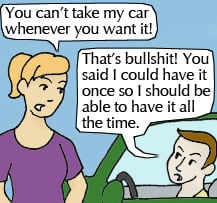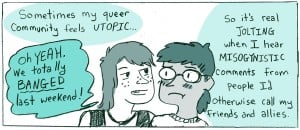Feminism (aka the F-word) continues to be treated as a scarlet letter by an alarming number of women, an attitude reinforced by a growing number of public figures.
Celebrities often give baffling answers as to why they’re not feminists, but more disturbingly, many millennials seem to harbor a distaste for feminism, too.
From actress Shailene Woodley (who for some unfathomable reason felt the need to affirm it twice) to singer Meghan Trainor (who has been hailed by some as a beacon of body positivity), younger women are making it clear that they just don’t see the need for feminism.
Even Illana Glazer and Abbi Jacobson, creators of the hit show Broad City, praised for depicting everything from active female sexuality to de-stigmatized marijuana use, awkwardly stumbled their way around the F-word in an interview – proof that even when you’re praised for feminist work, you’ll still desperately avoid having to label yourself as one.
Famous faces aside, it’s indicative of a disheartening trend. Women, particularly young women, seem to think of feminism as vitriolic at worst and antiquated at best.
But I also want to point out that some women of color as well as trans women dissociate from feminism because it often fails to be intersectional enough to include their communities, and sometimes actively rejects them. That’s a very valid point and deserves its own conversation.
However, what I want to talk about here in particular is a very specific (yet annoyingly common) strain of anti-feminist sentiment – the “I shave my legs, and I don’t hate men, so I’m not a feminist” type of argument.
Those who hold these beliefs don’t realize that by distancing themselves from feminism, they’re allowing sexism to fester, which actually just proves feminism necessary.
So let’s review how avoiding feminism enables sexism.
1. It Perpetuates the Idea That All Feminists Are Bitches
That’s right. If you’re tiptoeing around the F-word, I’m going to get to the point and break out the B-word.
You’re avoiding feminism because you don’t want to be called a bitch!
There’s the age-old misconception of feminists as constantly enraged, just skulking their way through life, eagerly awaiting any opportunity to be a killjoy. A feminist is the buzzkill ready to pounce into action and harsh your vibes by – gasp – holding you accountable for your words and actions. What a bitch.
You have to prove that you are the opposite of that. You’re fun! People have to know that you’re approachable! The best way to do that is to distance yourself from an ugly topic like feminism, right?
Just one small problem: Have you ever thought about why you don’t want to be called a bitch?
Bitch is a misogynistic slur.
Men use that word to put women down, and women internalize this mindset and use it to police other women.
Your reticence about the word bitch stems from the same forces that are behind your reticence about feminism – the patriarchy tells women that both of those identities are undesirable to embrace.
The notion that feminists are bitches and bitches are unworthy of respect is yet another tactic used to divide women. It’s time to start the unlearning process.
Just because you’re a feminist doesn’t make you a bitch. You’re not a bitch for standing up for your rights and demanding that people pay attention.
And even if you are, it shouldn’t matter because feminism teaches us not to judge our worth on patriarchal standards or allow them to dictate your behavior.
2. It Discourages Women from Speaking Up for Themselves
The aforementioned sentiment has unfortunate ripple effects.
Feminists are stereotyped as a roaming gang of surly, hairy man-haters. Some feminists do fall into this category, while others do not. Plenty of people with different attitudes and gender expressions identify as feminists.
Surly, hairy man-haters certainly comprise a portion of feminists, but they are not feminists because of that characterization. Nor should they be shunned for conforming to a perceived stereotype. Distancing ourselves from a group of women because they don’t “project the right image” is pretty contradictory to feminism’s main tenants.
Sure, I might be describing a caricature, but parts of it certainly reverberate with women. If it didn’t, feminism wouldn’t prompt such a visceral recoiling whenever it comes up in conversation.
Girls and women learn that the way to be liked is to fit in and avoid having strong opinions. As we’ve already discussed, feminism contradicts this impulse in every way. If even mentioning the word makes you cringe, you’re never going to feel comfortable bringing up gender issues.
You’re probably saying, “Well, who cares? How often do debates about feminism enter small talk?” But feminism isn’t always about duking it out over hot button political issues like abortion and birth control. It also impacts many aspects of your daily life.
Think about when you’ve gotten catcalled on the street. Does it make you uncomfortable? Maybe you feel pressure not to say anything because cool girls take it as a compliment. Over time, you’ve learned to accept it as part of your routine.
And that’s the problem. Women’s feelings are important. Our angers and frustrations are valid. We put up with a lot of crap in society. We deserve to open a dialogue to begin fixing things.
Yet the second we open our mouths, we apparently forfeit our right to be liked and respected. No wonder women are reluctant to voice their opinions at all, let alone enter the minefield of feminism.
Women should be free to express themselves without fear of being ostracized.
3. It Falsely Equates Misandry with Misogyny
As feminism gains steam, accusations of misandry have increased proportionally.
Misandry, or hatred of men, has become the rallying cry of anti-feminist groups. Feminists are allegedly out to flip the gendered power structure, put women in charge, and make men suffer as payback.
Cue the mainstream attempt at universalism that is the bane of any minority rights movement.
People often try to focus the attention back on the majority by claiming that the discrimination faced by the majority is equally as oppressive as that faced by the minority, even if the latter usually has hundreds of years of history to back it up.
Those who insist humanism is more inclusive than feminism argue that hating anyone for their gender is a bad thing, and feminists supposedly hate men, which merely perpetuates discrimination in a different packaging.
Except the vast majority of feminists don’t hate men! Feminism isn’t about hating men or scheming against them! Feminists are just trying to ensure that women have as many opportunities as everyone else, which involves working through centuries of oppression.
That’s where the false equivalence falls apart. Misandry and misogyny are not the same thing.
Yes, thinking that anyone’s gender makes them inferior is wrong, but misandry isn’t reinforced by social, political, and cultural power structures throughout history the way misogyny has been.
Additionally, believing that critiquing male privilege amounts to man-hating is just another way of silencing women’s experiences. I don’t hate men, but I do hate men who think feminism is all about hating men.
Misogyny has been deeply ingrained in our society for generations, so don’t disrespect women’s struggles by putting it on the same level as the overused defense of whiny dudebros.
4. It Sends the Message That Women Can’t Be Feminists If They Want Male Approval
When women are asked whether or not they’re feminists, a common response is “No, I like men!”
There’s a reason people assume feminists must be lesbians. Apparently, if you announce that you’re a feminist, you effectively torpedo your sex appeal to men forever. It isn’t shocking that straight women in particular are put off by this prospect.
As a result, there tends to be a lot of tepid answers when you ask women to clearly define their opinion about feminism because they’re worried that men will be turned off if they embrace a feminist identity.
In reality, feminism has nothing to do with whether or not you like men. It’s not supposed to be about men! That’s the point!
Supporting feminism does not – and should not – jeopardize your heterosexuality.
Any man who rejects your belief system or belittles problems in your community is not good boyfriend material. And if he goes so far as to call feminism a turnoff, he’s a misogynistic asshole who doesn’t deserve your attention in the first place.
You should never compromise your ideology to date someone, much less throw 50% of the population under the bus to do it.
5. It Deems Women Who Don’t Conform to a Certain Status Quo Inferior
Let’s face it: Deep down, a lot of people want to avoid feminists because they’re presumed to shun conventional beauty standards for women – aka they’re “intentionally ugly.”
Feminists are routinely masculinized and mocked for rebelling against gender expectations, such as shaving. Body hair on women is viewed as unhygienic, therefore feminists are seen as dirty.
Fun fact: Women never bothered shaving until a 1915 ad portrayed having hairless armpits as trendy and fashionable. Leg shaving didn’t catch on until a decade or two later.
Shaving was basically a giant marketing ploy orchestrated, unsurprisingly, by razor companies. Prior to that, body hair was never viewed as a problem.
Regardless, when you say “I’m not like women who [do or don’t do X, Y, Z],” you hurt all women, including yourself, by insinuating that only certain women are worthy of respect. This limits self-expression and gender expression for everyone.
Women are policed enough by men without piling the criticisms onto each other.
6. It Ignores the Experiences of Other Women
As you may have noticed, the celebrities I mentioned in the intro are overwhelmingly white women that are absolutely dripping in cash. They exemplify a specific type of anti-feminism that seems to be snowballing among white, middle to upper class women.
We’ve reached the point where feminism and acknowledging your gender is perceived as a hindrance. You don’t need special treatment if you’ve already achieved success. Dragging gender issues out into the open implies you have a chip on your shoulder.
However, you can’t invalidate a global movement the second it becomes irrelevant to your personal life or holds no opportunity for personal gain. That just fucks over everyone else who has a stake in the movement.
You wouldn’t eat a cheeseburger and then turn to a homeless person and say, “I don’t see the point of soup kitchens anymore. I’m not hungry!”
Just because you’re financially stable doesn’t mean millions of women aren’t struggling to make ends meet. Just because you’re in control of your sex life doesn’t mean millions of women aren’t being raped.
Stop judging the merits of feminism based on your own circumstances.
Try to acknowledge the circumstances of others and use your privilege to be an ally to those who are less fortunate.
7. It Displays an Incredible Misunderstanding of What Feminism Actually Is
For the millionth time, feminism is not about plotting to build a matriarchy or pitting men against women.
So many people have poured so much effort into reassuring everyone that they’re not feminists that these stale distortions of feminism continue to circulate.
Also, we’ve entered an era where it’s in vogue to identify yourself as a humanist rather than a feminist to illustrate that you’re in favor of gender equality – except that feminism has championed that cause since its inception.
Feminism seeks to put all genders on the same level as men with the same rights and opportunities. Last time I checked, that feels a lot like gender equality.
Feminism has been historically demonized with the intent of keeping women and other gender minorities down, but it’s time to recognize and appreciate the movement for what it really is – the notion that all people deserve a fair shot.
We need to band together instead of walking on eggshells to kowtow to the status quo.
***
Feminism isn’t a four-letter word and shouldn’t be treated as such.
It holds a great deal of potential for our own futures, as well as the future of generations after us. We do ourselves a great disservice the longer we consider feminism to be a taboo subject.
So go ahead, embrace the F-word.
[do_widget id=”text-101″]
Erin Tatum is a Contributing Writer at Everyday Feminism. She’s a feminist, queer theory lover, and television enthusiast living in Pennsylvania. She is particularly interested in examining the representation of marginalized identities in media. In addition to Everyday Feminism, she’s also a weekly contributor to B*tch Flicks. Follow her on Twitter @ErinTatum91.
Search our 3000+ articles!
Read our articles about:
Our online racial justice training
Used by hundreds of universities, non-profits, and businesses.
Click to learn more





















